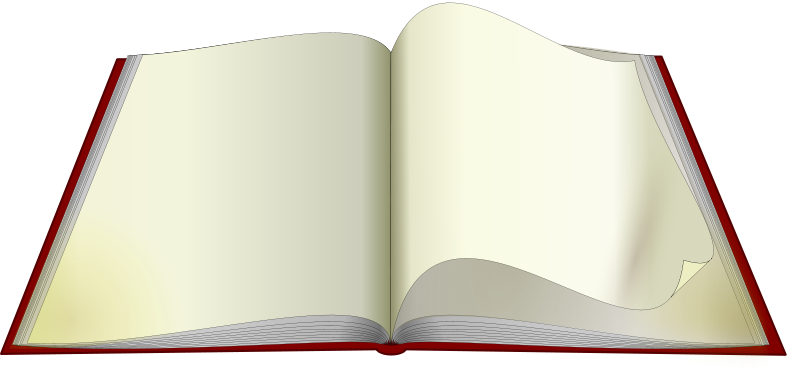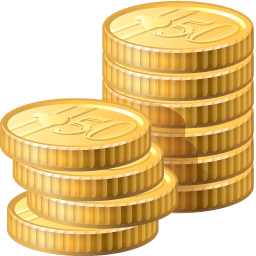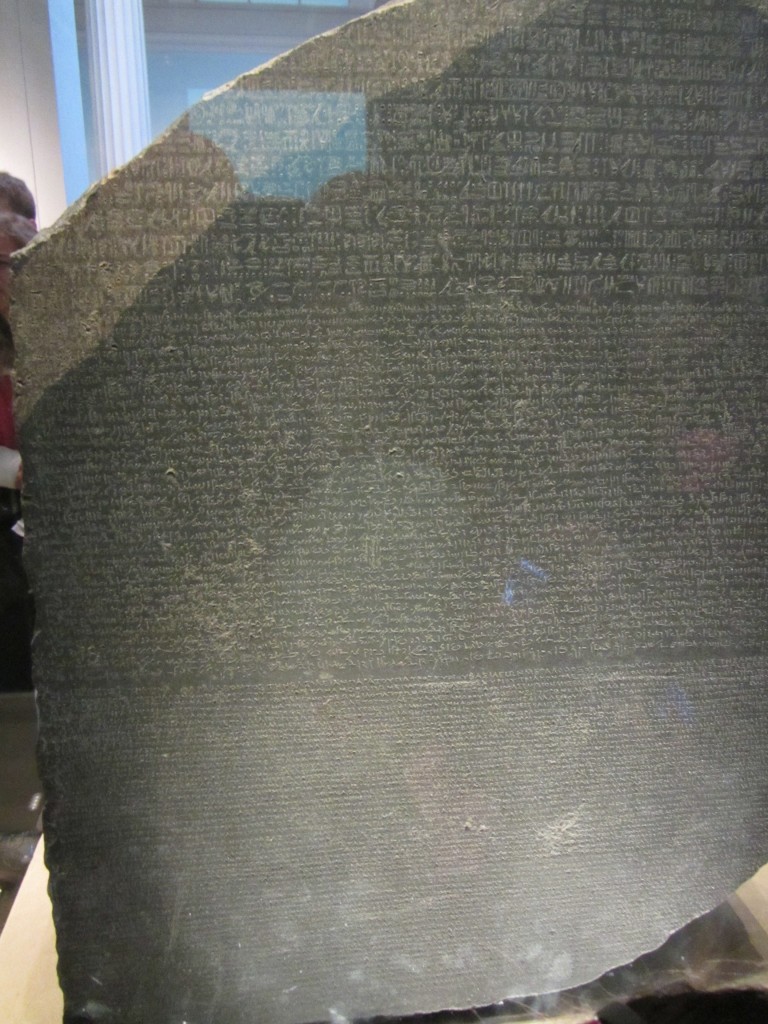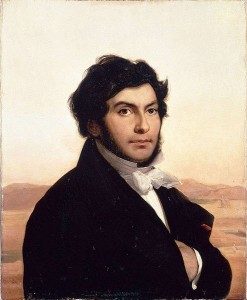Once upon a time…

Once upon a time, there was a young boy called Jean-François who was very quiet and studious. Oddly enough, although he loved books, he was not content with reading only his own language.
He wanted to read languages that he could not understand.
In fact, the languages that almost no one could understand interested him more than anything else. The only people who knew these languages were scholars in universities who had spent their lives in the study of ancient texts and musty scrolls.

Jean-François learned Persian and Sanskrit, along with many other ancient tongues. He also began work on a dictionary and grammar of the Coptic language and used this language to write his journal.
At the time, he had no idea that this language would allow him to unlock an ancient mystery, a written script that people hadn’t been able to read for more than 1500 years. Through his work, scholars can now read hieroglyphics, the written language of the ancient Egyptians.
There is of course a moral to this story. You may think something you’re learning now is just for fun, or perhaps that you are learning it just because your teacher wants to be a slave-driver.
 Nevertheless, put your new knowledge on the back-burner of your mind and let it gently simmer. One day, in a decade or two, it might help you to find a job, learn a related skill, develop a product or medicine, write a book or change the world. Even if this knowledge is never employed for a precise and discernible purpose, it will become part of the creative and versatile human being that you already are and will continue to become.
Nevertheless, put your new knowledge on the back-burner of your mind and let it gently simmer. One day, in a decade or two, it might help you to find a job, learn a related skill, develop a product or medicine, write a book or change the world. Even if this knowledge is never employed for a precise and discernible purpose, it will become part of the creative and versatile human being that you already are and will continue to become.
 A story within a story:
A story within a story:
Euclid was an ancient Greek whose mathematical textbooks were used until the 19th century and whose work is still the basis of related study today. He was teaching a young man geometry when his student, after learning the first theorem, unwisely asked: “What shall I get by learning these things?” Euclid called his slave and said: “Give this young man a few coins, since he must get something from what he learns”.
Perhaps this is what Euclid meant:
When you learn something, you shouldn’t worry what it gives you. Leave that to the “grand Perhaps”, in Robert Browning’s words.
Kind regards,
Ms Green

With the help of this stone and the ancient tongues he had learned as a child, Jean-Francois Champollion unlocked a 1500-year-old mystery. It is because of him that we know so much about the ancient Egyptians.
The Power of the Written Word
 The power of the written word is immense. With our ability to write, we can compose a love poem, pass laws that bring justice to thousands (or deny it), pen moving lyrics for a song, tap out a tweet, write a comment online or correspond with a loved one far away.
The power of the written word is immense. With our ability to write, we can compose a love poem, pass laws that bring justice to thousands (or deny it), pen moving lyrics for a song, tap out a tweet, write a comment online or correspond with a loved one far away.
Human talents such as writing can help us to soar above the tiresome details of everyday life, but they can also be employed for destructive purposes. For instance, you could write lies and slander and so use the written word to destroy reputations. If you were a dictator or a tyrant, you could issue orders that might destroy the lives of the people you were oppressing. You could use writing to enslave others. You could even write a death sentence.
All the same, can you imagine how many aspects of human life would be different, how impoverished life would be, without this simple, supreme gift of human expression?
You see, once you can write down a language, you can preserve ideas beyond your own lifetime and send them across the world.
You can give orders, compile books of quotations, remember speeches and create literature. Your ideas can travel through time and space. They are no longer dependent upon your physical presence.
Writing makes us all time travellers.
Writing in Ancient Egypt
The ancient Egyptians used writing to administer their complex hierarchical society, to give orders, to tot up taxes, to write the spells that would protect the dead in the afterlife and to describe their lives. Their tombs were covered with the beautiful, pictorial symbols we call hieroglyphics.

The knowledge of how to read ancient Egyptian hieroglyphics, however, was lost for more than 1500 years, until Jean-François Champollion figured out how to decipher these beautiful and mysterious symbols. As a boy he used to write his journal in Coptic, the language used by the early Christian Church in Egypt, but long since dead.
A language is considered dead when no living child speaks it as his mother tongue. No living child had spoken Coptic for over 1500 years, but it turned out to be the one written language that could provide clues to the sounds of ancient Egyptian speech.
Never suspecting that Coptic might supply the vital link to understanding hieroglyphics, Champollion learned it as a teenager, along with several other dead languages. It was knowledge that he placed on the back-burner of his mind. One day that knowledge would burst into flame. One day it would illuminate the study of ancient Egypt.
TASKS
As you read the links below, look for or think of answers to these questions (and write or type brief notes):

a Write your name in hieroglyphics and write 3 dot points about the characteristics of this ancient script.
b What is a cartouche? How did this symbol help in the decipherment of hieroglyphics?
c Champollion wrote that “phonic” symbols were the basis of hieroglyphics. What does this mean?
d Write a comment: How can writing be used for positive, life-affirming purposes? Conversely, how can it be employed to hurt, to harm or to oppress other human beings?
1 Discover the basic details of hieroglyphics at these links:
http://www.ancientegyptonline.co.uk/hieroglyphs.html
2 Learn how to write your name in hieroglyphics at this link:
http://www.guardians.net/egypt/hieroglyphs/hiero-translator.htm
3 Read the whole fascinating story behind the decipherment of ancient Egyptian hieroglyphics at this link:
http://www.bbc.co.uk/history/ancient/egyptians/decipherment_01.shtml


Writing was a major breakthrough in human history. Originally, writing was developed so that people could record what they bought and how much money they paid for it. Sellers could keep track of what they sold and check whether buyers were paying the right amount.
Eventually, people began to find other uses for it, including stories, communicating with each other and even recording history as it was being made! You can write down your memories and share thoughts through the power of writing.
However, all this came with its downside. We will never know if what we read about the past is true because ‘history is written by the victors’. Also, writing could have been used to hold things against someone and make them sign things they don’t agree to. It could be used to force people into deals and they wouldn’t be able to do anything to stop it!
Despite the fact that writing isn’t always used in a positive way, it is a very important part of our lives. You can write up agreements and rules that could benefit you and the others around you. Without writing, it would be almost IMPOSSIBLE for you to educate yourself and learn. Writing is an essential part of our lives; we just need to learn to use it in a positive way.
Writing is like a double-edged sword: on the one hand, it can communicate vital information and is the base of modern life today, but on the other hand, it has dark powers like legalising the negation of rights of the Stolen Generation and signing cheques to pay the assassins through history. Writing gives people a power and a strength that is greater than the sword, but it may also put the disadvantaged at an even greater disadvantage. The pen signed the Magna Carta but also made deals from America to Afghan (not that America would give weapons to Afghan *cough cough sarcasm) and that made the lives of millions of people worse. On the positive side, writing makes education and trading a possibility.
The POWER And DANGERS Of Writing – By Dylan
To all readers reading my writing:
Writing can be used for all sorts of purposes, both advantageous and disadvantageous. Without writing, we would not have education and education is the key to making our world better in so many ways.
With good writing there is always strong education. When someone is educated, then they make big decisions that could affect not only themselves, their family, but their community or the state that they live in. writing is also an advantage because now we know a lot about the history of how this world has been shaped through time. Good writing also means fair laws: no racism or exclusion in any ways. Writing is also the key to oral communication. The power to communicate keeps everyone civilised, organised and successful in their own ways.
On the other hand, people like Kim Jong Un, Donald Trump and other notable characters throughout history have proven that writing presents a threat to humankind. Writing could violate some human rights that everyone ought to have. Because of writing, deaths have been caused unfairly, for writing is also employed by the people who want control and power over others.
Writing comes in different forms; it is just what people decide to do with it. Writing should be harnessed for the power of good. It should not be used to attack people. Writing is a tool of immense power; there are those who write caring letters to others and there are those who use the gift of writing to crush their enemies. Writing has brought the world together. Writing was the basis of the Magna Carta; without it what would happen to the world? Writing has allowed human beings to shape the world into what it is now.
Greetings assets. Writing is a gift which will forever leave a bloodstain wherever it is used. While it may be one of the most useful properties we possess, possibly the most useful, it still is one of the most dangerous factors keeping us a race bound together by a silken thread, since there are contracts, decrees, letters and also orders of execution. Policies are used to keep us together as one, in rules that bind us together and protect us, theoretically, from chaos. Writing is potentially a supreme peacekeeper that is essential for our survival, but it can be used in ways that corrupt one’s mind – to do evil things. Despite most of these ‘negative’ accusations, writing will nevertheless provide many advantages. It all comes down to the heart of the user: the pen holder, not the tool.
Hi Ms Green,
Writing is the key to open the door to knowledge. Writing is something that most educated people know how to do. Writing is used to help communicate, teach, read and discover humanity’s history. Although writing has many benefits, it also has many disadvantages. It can be used to threaten people and blackmail them.
Writing has helped scientists discover our history. Scientists and historians use hieroglyphics to find out how people lived in Egypt, their language and their pharaohs’ names. Scientists also record their information by writing in books. Teachers use textbooks and websites, which have writing, to teach their students. Students read books for their own enjoyment. People communicate using writing. Writing is what makes the world go round.
Although writing may have some obstacles along the way, just like a key that does not turn, you just have to jiggle it until you open it. If we pass through all the challenges along the way, we will eventually open the door to knowledge with writing.
Thanks for reading!
Writing is a tool to create a message that can be read by others that know the language. It was created a long time ago, to make receipts as proof of purchase. Some people use this tool now for good, to write poems and other great works of literature, but some use this tool for evil, like creating unfair rules or blackmailing others. There are many ways of writing, this is just one of them. The problem with having so many languages with their own writing is it is sometimes hard to write to someone in another country. Now, we have many online translators to deal with this problem.
Writing is a significant factor of our history. Without it, we would not have education, stories, memories or even information from the past!
However, like everything in life, writing has a positive side to it and a negative. Despite the amazing things writing can do, some people take advantage of it to harm, bully and treat others negatively. Passing laws to banish people from a certain place can isolate people. Putting innocent people in jail by the power of one word can ruin their lives. Unfortunately, these cruel actions have happened and are probably happening while you are reading this.
Despite the harmful deeds writing has allowed people to do, there are many excellent purposes others have adapted for writing. Humans who have the ability to write can educate others, write stories and poems, record important information and express their emotions. The incredibly useful form of conveying messages can also allow you to spread information and share opinions. The signing of the Magna Carta restricted King John’s power with just a flick of a pen. You can communicate efficiently with relatives or friends on the other side of the world!
Writing is an important part of our lives, whether we use it for good or for bad. Some people will continue to be negative and harmful to others. We can only educate more people about the good about writing to stop the bad. After all, it’s the people who write, not the pen.
The Power of Writing
Writing is very important and can be used in many different ways. Without writing humans would not be where they are now.
Writing can be used to teach. Without writing it would be much harder to learn, as you would not be able to take notes, you would have to remember it all, and bit by bit, you would forget what you had learned.
Writing is used to communicate. With writing you can communicate with someone on the other side of the globe. Writing can be used to tell stories and make sure that memories are not forgotten. Writing can also be used to give hope and inspire but on the other hand, some people take advantage of writing and use it to bully and harm people.
Writing can be used to enslave or imprison people. Writing can isolate people and establish laws that do evil more than good.
Writing can affect people in the most influential way. It can be amazing and cruel. It can do awful things to people and their lives and do good; yet without writing human civilization as it now exists would not even be possible.
Even though writing can bring memories and stories alive, it could also kill someone. It can be filled with hatred and disgust. It could be full of lies and you would not even know it! Some do not know that words are powerful; they can hurt and they can express love but not everyone chooses to love. Some people use words to bully others, in order to bring themselves up and put others down.
Still, writing is a skill that helped to create civilization, that became the basis of schooling and allowed us to preserve our knowledge. Writing is influential. It can influence the reader. Texts can change your emotions, how you feel about the subject. Writing can help people. Words have power.
Without writing civilization as it now is would not exist. All we have to do is use it in the best way possible.
Writing is both a gift and a curse. It can be employed both to create an alliance between friendly countries and to start a war between hostile ones. Writing can free or enslave. It can be the difference between a mansion and a life of luxury, or living on the streets. Writing is beautiful and deadly, and it all started with receipts in ancient Mesopotamia!
We could not discuss these issues of writing without writing! Moreover, philosophy, in itself, relies on writing. From Zeno’s paradoxes and Aristotle’s logic to the endless arguments of geriatric professors – it all comes down to language and the written word.
The Power of the Written Language
“The pen is mighter than the sword.” – Is this true? In some ways yes. It depends how you use it. Say, if a person was going to stab you right then and there, a sword might be better. However, writing can bring down countries, bring down people, pull people apart and bind them together. It can also save people, show people who owns what, record history and tell truths; but writers can also tell lies. It can make people cry and laugh, it just depends how you use it.
So how can you use it? You could bind people together with a document which certifies a marriage. You could pull people apart with a restraining order or a document that ratifies a divorce, which pulls families apart. There are negatives and positives.
Let’s talk about the negatives. In the past, people could use writing to cause distrust or as a means of betrayal. For example, a letter was sent to Alexander the Great in the past when he was sick with a serious fever. The letter told him that his doctor had poisoned his medicine. However, when his doctor came to give him his nightly medicine, he drank it while he handed the doctor the letter. The doctor, after reading the letter, was baffled.
“How did you know it wasn’t poisoned?” the doctor asked.
“I don’t know about poison, but I know my men,” Alexander replied.
Smart Alexander. He recovered from his cold and went back to conquering.
Especially in the modern world, writing has become more dangerous. Back then, there wasn’t any internet, so they had to send letters. These letters took weeks or months to reach their intended recipient. Now, we can send an email to someone across the world in 5 minutes. It’s efficient. It’s useful. But social media has gone slightly insane. Some apps have chatrooms which allow you to talk to random people across the world. This is a problem as people don’t know who they’re talking to; yet these apps are becoming increasing popular.
This new era has brought a new danger in writing. With our new gadgets, writing won’t ever be quite the same again.
All the same, there are quite a few positives of writing. In the past, a written script could be employed to record history and produce great literature, to confirm or restore people’s rights and to return peace to war-torn countries.
A peace treaty can bring stability to warring nations. It can make people cry with joy and maybe even sleep a good night’s sleep after turmoil and struggle. Maybe they were holding back a sigh of relief. They can finally have a somewhat calmer life. It’s not much for the poor souls at rest, or their families, but it is something.
The Magna Carta is the foundation of most Western laws. It was drafted for King John’s barons in order to reduce the power of the king. First drafted by a archbishop to establish peace between the king and his barons, it promised the protection of church rights, protection for the barons from illegal imprisonment, access to swift justice, and limitations on feudal payments to the Crown, to be implemented through a council of 25 barons. Neither side stood behind their commitments, and the Charter was annulled by Pope Innocent III, leading to the First Barons’ War. In the 21st century, only 4 exemplifications of the original 1215 charter remain intact, held by the British Library and the cathedrals of Lincoln and Salisbury.
Over the centuries, people and circumstances have changed, and writing has changed with them. From only high-born people being able to write, now almost everyone can, at least in societies with universal education. From being able to write poems to treaties, letters and betrayals, writing is something that most people can do.
Writing is power, giving us more opportunities to share our stories. Writing is a form of expression, and just as important as the human voice. Voices fade. Writing, if well-preserved, can last for centuries. Writing is hope and despair, humour and fear, logic and imagination, love and hate, conveying the human voice without ever speaking. Writing is power.
Dear Maggie,
You are the proof that the power of writing can be employed to develop and express the most profound ideas.
Regards from Ms Green
POWER OF THE WRITTEN LANGUAGE – Sandra
The power of the written language is phenomenal. We can use this essential skill to write poetry or a story; we can also employ it to keep memories and learn history or to communicate with other people, even from the other side of the world! However, even though we often hear about the positive aspects of writing, have you ever thought about the negative side? Writing can also be used to destroy reputations. Cyber-bullying is an example of this. People can type up lies to discriminate against others, then in a click of a button, these lies can be seen by the world.
“The joy of writing. The power of preserving. Revenge of a mortal hand.”
– Wislawa Szymborska
Despite what I have just described, writing is an amazing gift, an utterly supreme gift. As Malals Yousafzai once said: “There is no greater weapon than knowledge and no greater source of knowledge than the written word”.
Regards,
Sandra